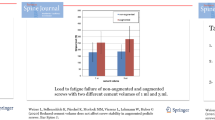Abstract
The bone–screw interface has been indicated as the weak link in pedicle screw spine fixation. Bisphosphonate treatment may have the effect of improving bone–screw interface fixation in spine fusion by inhibiting bone resorption. An experimental study was conducted using a porcine model to evaluate the influence of alendronate treatment on bone–pedicle screw interface fixation. Eleven pigs in the treatment group received alendronate 10 mg/day orally for three months postoperatively. The other 11 pigs served as a control group. Posterior lateral fusion with the CD Horizon pedicle screw system was performed with autograft on the lumbar spine on all animals. Biomechanical torsion test and histomorphometric parameters of screw fixation were evaluated three months after the operation. The maximum torque and initial angular stiffness of the treatment group was higher than that of the control group, but there was no statistical significance. The bone–screw contact surface was 23.3 ± 10% for the treatment group and 9.8 ± 5.9% for the control group (P < 0.01). This study indicated that alendronate treatment increased bone purchase of stainless steel screw surfaces.



Similar content being viewed by others
References
Chapman JR, Harrington RM, Lee KM (1996) Factors affecting the pullout strength of cancellous bone screws. J Biomech Eng 118:391–398
Christensen FB, Dalstra M, Sejling F (2000) Titanium-alloy enhances bone-pedicle screw fixation: mechanical and histomorphometrical results of titanium-alloy versus stainless steel. Eur Spine J 9:97–103
Davne SH, Myers DL (1992) Complications of lumbar spinal fusion with transpedicular instrumentation. Spine 17:S184–S189
DeCoster TA, Heetderks DB, Downey DJ (1990) Optimizing bone screw pullout force. J Orthop Trauma 4:169–174
Dickman CA, Fessler RG, MacMillan M (1992) Transpedicular screw-rod fixation of the lumbar spine: operative technique and outcome in 104 cases. J Neurosurg 77:860–870
Frenkel SR, Jaffe WL, Valle CD et al (2001) The effect of alendronate (Fosamax) and implant surface on bone integration and remodeling in a canine model. J Biomed Mater Res 58:645–650
George DC, Krag MH, Johnson CC (1991) Hole preparation techniques for transpedicle screws. Effect on pull-out strength from human cadaveric vertebrae. Spine 16:181–184
Gundersen HJ, Jensen EB (1987) The efficiency of systematic sampling in stereology and its prediction. J Microsc 147(Pt 3):229–263
Hilding M, Ryd L, Toksvig-Larsen S (2000) Clodronate prevents prosthetic migration: a randomized radiostereometric study of 50 total knee patients. Acta Orthop Scand 71:553–557
Jacobs JJ, Sumner DR, Galante JO (1993) Mechanisms of bone loss associated with total hip replacement. Orthop Clin North Am 24:583–590
Krag MH (1990) Spinal instrumentation: biomechanics of transpedicle spinal fixation. In: Weinstein JN, Wiesel SW (eds) In the lumbar spine. W.B. Saunders, Philadelphia, pp 916–940
Krag MH, Beynnon BD, Pope MH (1988) Depth of insertion of transpedicular vertebral screws into human vertebrae: effect upon screw-vertebra interface strength. J Spinal Disord 1:287–294
Kwok AW, Finkelstein JA, Woodside T (1996) Insertional torque and pull-out strengths of conical and cylindrical pedicle screws in cadaveric bone. Spine 21:2429–2434
Li J, Mori S, Kaji Y (2000) Concentration of bisphosphonate (incadronate) in callus area and its effects on fracture healing in rats. J Bone Miner Res 15:2042–2051
Luckman SP, Hughes DE, Coxon FP (1998) Nitrogen-containing bisphosphonates inhibit the mevalonate pathway and prevent post-translational prenylation of GTP-binding proteins, including Ras. J Bone Miner Res 13:581–589
Lugero GG, de Falco Caparbo V, Guzzo ML (2000) Histomorphometric evaluation of titanium implants in osteoporotic rabbits. Implant Dent 9:303–309
Mochida Y, Bauer TW, Akisue T (2002) Alendronate does not inhibit early bone apposition to hydroxyapatite-coated total joint implants: a preliminary study. J Bone Joint Surg 84A:226–235
Ohlin A, Karlsson M, Duppe H (1994) Complications after transpedicular stabilization of the spine. A survivorship analysis of 163 cases. Spine 19:2774–2779
Petersen MM, Lauritzen JB, Pedersen JG (1996) Decreased bone density of the distal femur after uncemented knee arthroplasty. A 1-year follow-up of 29 knees. Acta Orthop Scand 67:339–344
Pihlajamaki H, Myllynen P, Bostman O (1997) Complications of transpedicular lumbosacral fixation for non-traumatic disorders. J Bone Joint Surg Br 79:183–189
Russell RG, Rogers MJ (1999) Bisphosphonates: from the laboratory to the clinic and back again. Bone 25:97–106
Sanden B, Olerud C, Johansson C (2001) Improved bone-screw interface with hydroxyapatite coating: an in vivo study of loaded pedicle screws in sheep. Spine 26:2673–2678
Soininvaara TA, Jurvelin JS, Miettinen HJ (2002) Effect of alendronate on periprosthetic bone loss after total knee arthroplasty: a one-year, randomized, controlled trial of 19 patients. Calcif Tissue Int 71:472–477
Tokugawa Y, Shirota T, Ohno K (2003) Effects of bisphosphonate on bone reaction after placement of titanium implants in tibiae of ovariectomized rats. Int J Oral Maxillofac Implants 18:66–74
Tonino RP, Meunier PJ, Emkey R et al (2000) Skeletal benefits of alendronate: 7-year treatment of postmenopausal osteoporotic women. Phase III Osteoporosis Treatment Study Group. J Clin Endocrinol Metab 85:3109–3115
Venesmaa PK, Kroger HP, Jurvelin JS (2003) Periprosthetic bone loss after cemented total hip arthroplasty: a prospective 5-year dual energy radiographic absorptiometry study of 15 patients. Acta Orthop Scand 74:31–36
Venesmaa PK, Kroger HP, Miettinen HJ (2001) Alendronate reduces periprosthetic bone loss after uncemented primary total hip arthroplasty: a prospective randomized study. J Bone Miner Res 16:2126–2131
Wilkinson JM, Hamer AJ, Rogers A (2003) Bone mineral density and biochemical markers of bone turnover in aseptic loosening after total hip arthroplasty. J Orthop Res 21:691–696
Wilkinson JM, Stockley I, Peel NF et al (2001) Effect of pamidronate in preventing local bone loss after total hip arthroplasty: a randomized, double-blind, controlled trial. J Bone Miner Res 16:556–564
Wittenberg RH, Shea M, Swartz DE (1991) Importance of bone mineral density in instrumented spine fusions. Spine 16:647–652
Yaffe A, Iztkovich M, Earon Y (1997) Local delivery of an amino bisphosphonate prevents the resorptive phase of alveolar bone following mucoperiosteal flap surgery in rats. J Periodontol 68:884–889
Zindrick MR, Wiltse LL, Widell EH et al (1986) A biomechanical study of intrapeduncular screw fixation in the lumbosacral spine. Clin Orthop 99–112
Acknowledgements
The authors thank Anette Milton and Lisa Feng for technical assistance. This study was partly supported by Gigtforeningen (The Association of Rheumatology) (J.nr.233-845-07.06.01). Medtronic Sofamor Danek provided instrumentation for the first 20 operations.
Author information
Authors and Affiliations
Corresponding author
Rights and permissions
About this article
Cite this article
Xue, Q., Li, H., Zou, X. et al. Alendronate treatment improves bone–pedicle screw interface fixation in posterior lateral spine fusion: An experimental study in a porcine model. International Orthopaedics (SICOT) 34, 447–451 (2010). https://doi.org/10.1007/s00264-009-0759-4
Received:
Revised:
Accepted:
Published:
Issue Date:
DOI: https://doi.org/10.1007/s00264-009-0759-4




